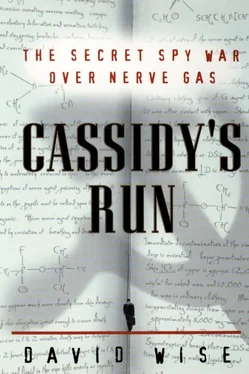SHOCKER, as this book has revealed, cost the lives of two FBI agents. It may arguably have placed the lives of many more Americans at risk by providing Soviet scientists with the formula for a secret, albeit unstable, nerve gas—information that might have proved useful or spurred the Russians to accomplish a breakthrough in that deadly field.
At the same time, SHOCKER achieved many of its intelligence goals. Ten Soviet spies were identified, including three illegals: the PALMETTOS and IXORA. [1] The ten spies were the six Soviets who handled Joe Cassidy, IXORA’S control, and the three illegals. The six Soviet handlers were Boris M. Polikarpov, Gennady Dimitrievich Fursa, Boris G. Kolodjazhnyi, Mikhail I. Danilin, Oleg Ivanovich Likhachev, and Vladimir Vybornov. The seventh Soviet spy was Nikolai I. Alenochkin, IXORA’s handler. The three illegals were Gilberto Lopez y Rivas, and his wife, Alicia Lopez, the PALMETTOS; and Edmund Freundlich, IXORA.
The surfacing of the illegals, rare in the annals of espionage, alone justified the lengthy counterintelligence operation, at least in the view of the FBI agents who ran it.
By the questions the Soviets put to WALLFLOWER, the FBI and the Pentagon discovered a good deal about what the Russians knew and did not know about American military strength and secrets. The United States also learned more about how the Soviets recruited and ran American agents and more about their tradecraft techniques as well, from hollow rocks, new chemicals for secret writing, and rollover cameras, to codes and communications.
In addition, the six Soviets sent to handle Joe Cassidy were kept busy running a controlled source, which left them less time to recruit and run real spies. From defectors and Soviet scientists now in America, the FBI obtained fragmentary feedback indicating that the Russians had wasted time and money trying to replicate or counter GJ, the nerve-gas formula fed to them by Joe Cassidy. But as Vil Mirzayanov disclosed, they also developed Novichok.
Operation SHOCKER was only one skirmish in a much larger war. Both superpowers were secretly working at full tilt to develop hideous nerve-gas weapons. If the sarin and VX brewed in the labs of Edgewood or the soman and Novichok produced in the plants along the Volga had ever been unleashed in war, millions of people might have perished. Few Americans or Russians knew about the secret research conducted and the nerve-gas weapons produced in their respective countries.
During the cold war, the world lived with the constant threat of nuclear annihilation. The essential insanity of the period was captured by a single, familiar acronym: The nuclear strategy of the United States, mirrored by that of the Soviets, was officially called Mutual Assured Destruction (MAD).
As the cold war has receded into history, the nuclear danger has diminished but by no means disappeared. Today, there is increased concern over the threat of biological and chemical warfare.The 1995 sarin attack in the Tokyo subways and the emergence of terrorism at home—including the bombings of the WorldTrade Center in NewYork and the federal building in Oklahoma City—have led to greater public awareness that the new peril might come not from the atom but from weapons of all kinds, including a droplet of nervegas or a microscopic anthrax spore.
The vulnerability of American civilians and the nation’s military forces to chemical and biological warfare has become a politically volatile issue. Gulf War syndrome, the unexplained illness that has struck thousands of U.S. troops who served in the 1991 war against Iraq, is blamed by many veterans and at least some experts on exposure to nerve gas. After years of denials, the Pentagon admitted in 1996 that American troops might have been exposed to nerve gas when combat engineers blew up an ammunition dump at Khamisiyah in southern Iraq in March 1991. [2] A CIA report released in 1997 provided further details; the munitions stored at the site included 122 mm “binary sarin” rockets “filled with a mixture of GB and GF.”
The political sensitivity of anything to do with nerve gas might explain why the Pentagon has refused to make any information available about Operation SHOCKER. The Defense Department, it can be assumed safely, does not want to explain why it approved passing any data about nerve gas to the Russians, especially information about a nerve gas for which there is no known antidote, even though the gas was never perfected and put into production.
One of the army intelligence agents who worked on Operation SHOCKER for many years had a son who served in the Gulf War. He spoke about the risks of the deception phase of Operation SHOCKER but would not allow his name to be used. Even so, he was extremely reticent and guarded in his comments, until suddenly he blurted out, “Wouldn’t it be a shame if you killed your kid because of something stupid you did twenty years ago?”
Behind his comment were presumptions that the information passed from Edgewood to Moscow in some way enhanced the Soviet nerve-gas program and that the Russians in turn helped Saddam Hussein to acquire chemical weapons. But the extent of such aid is uncertain. Vil Mirzayanov has asserted that the Soviets gave Iraq Agent 33 and perhaps other chemical weapons, although he also said he was sure that Novichok was not sent to Iraq.
Some of the people involved in the Iraqi chemical-weapons program did study in the Soviet Union. For example, Dr. Emad el-Ani, a leading Iraqi chemical-weapons expert, studied at the Timoshenko Defense Academy, the Soviet chemical-warfare school in Moscow. And in 1995, Russia’s Federal Security Service (FSB) said it had blocked an attempt by Lieutenant General Anatoly Kuntsevich, former deputy chief of Soviet chemical-weapons forces, to sell five tons of nerve-gas components to Syria. The FSB reportedly concluded that the chemicals were really destined for Iraq.
According to American officials, there is little evidence that Iraq received significant assistance from the Soviets in procuring or producing its supplies of nerve gas. One high-level U.S. arms-control official said that Saddam Hussein obtained the equipment he needed to manufacture nerve gas mostly from Western European companies. The chemicals themselves, such as ordinary alcohol and organophosphate compounds, are easily available. “It is probably not beyond the ability of a reasonable Ph.D. in organic chemistry to mix the stuff together,” the official said. “It’s not clear they would need help from the Soviets.”
A CIA official cautioned that the agency had only fragmentary information on possible Soviet help to Iraq’s nerve-gas production and added, “By the mid-nineteen eighties, they [the Iraqis] had pretty much indigenous capability. They did not have to go outside.”
Charles A. Duelfer, the deputy chairman of the United Nations Special Commission (UNSCOM), which was created after the Gulf War to search for Iraqi weapons of mass destruction, said, “We have no firm evidence that there was direct Soviet involvement in the Iraqi chemical program…. Which is not to say it didn’t happen, but we haven’t seen any direct evidence.”
Few of thescientists on either side seemed to have many regrets about their role in developing nerve gas; Vil Mirzayanov and Saul Hormats were the exception, not the rule. “Millions of civilians will die if nerve gas is used,” Hormats, the former director of development at Edgewood, said in an interview with the author. “We would kill a whole generation of babies.” Hormats worked at Edgewood for thirty-seven years, and his views changed only gradually. “Had we gone to war with the Soviets in the nineteen fifties, CW would have been a decisive weapon,” he said. “We would have won more battles, and less of our soldiers would have become casualties. My responsibility was to help our army fight the war with minimum casualties and the greatest chance of success. As for morality, is it more moral to kill a soldier, to disembowel him and leave him to die, or to have him take a whiff of gas and die in five minutes? Which is more moral? The immorality—and half a dozen generals would say same thing—is the sons of bitches who get us into war, not how the war is fought.”
Читать дальше












